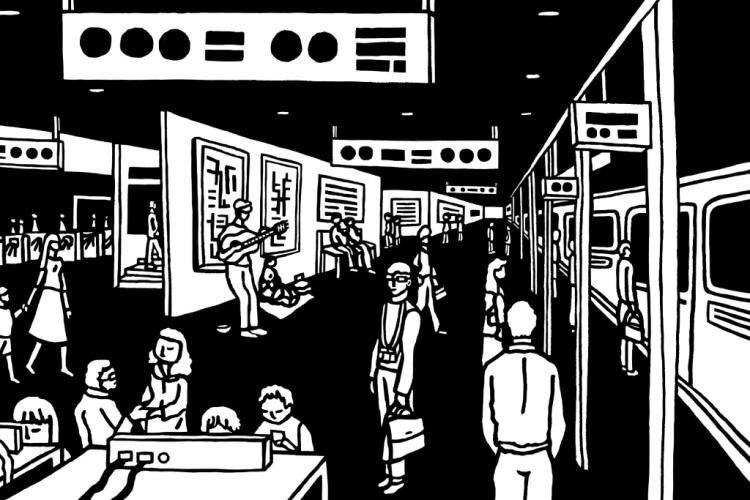
Metal Straws and Instagram Stories Are Not Enough
On today’s Open Column, Erin Alisya Setiawan discusses the hypocrisy behind social media activism, climate change, and the urgency of real action.
Words by Whiteboard Journal
For the past few months, I do not think I have been able to go on Instagram without seeing a new trending post. It changes topic — one day it’s about Sudan and the next is about the forest fires. But each time a new post gets trending, thirty of my friends repost the same thing.
I’m taking the environmental systems class at school. When my teacher showed a documentary about the trashed Citarum River, everyone had violent reactions. They gasped, they winced, they shook their heads and they scoffed at how disgusting the river was. To be fair, the documentary did show a lifeless goat floating along the river and frankly, anyone would be shocked at the sight of that. But what disgusted me the most was the obvious lack of self-awareness my peers had.
Often times, I get scolded for “not caring enough”. I never talk about world issues on my Instagram page or reposted stories, and I did not change to a blue profile picture a few months ago. But since when has my social media presence vouched for how much I care?
I care about politics the way every person should. Though I find it infuriating and oftentimes, a futile concept, I think politics is a significant part of Indonesia whether I like it or not. I despise corruption, injustice, derogatory laws and the obvious discrimination it poses against minorities. I care about the environment the way all of Earth’s inhabitants should. I believe in climate change and I am scared of its dire effects on the world I live in. Of course, I was shocked at the red skies in Jambi but you would not know that if you saw my Instagram because I did not post it.
I have only ever posted something once on my social media page that would resemble one of a “social justice warrior”, a term that I think is used more mockingly than endearingly nowadays. I posted about selective empathy and how people were talking about Sudan, yet ignoring the human rights violations in Hong Kong. I thought, how can someone act like they care so much about one issue and yet ignore its counterpart on another continent? Was it because Sudan was more of a trending topic? Was it because their favorite celebrities turned their profile pictures to blue? I am not trying to say that Sudan did not need attention, because the issue definitely needed to be discussed. But, I could not help but be disappointed at the so-called social justice warriors that cared about human rights and peace, yet ignore the issue occurring in our own continent because it was not as mainstream as Sudan was. I thought it was hypocritical. I still do.
Not only that, if I asked a friend of mine about the issue they were reposting about, I would find out that they actually knew little to none. I have always been a firm believer that you should not advocate for something if you knew nothing about it. It is not to say that no one should be an advocate, but I firmly believed that if you want to speak up, you should at least have some credibility and facts to back you up. It was disappointing to know that the people reposting the same Instagram stories have gathered all their facts from Instagram pages, instead of taking the time to look it up on the news and gather information from reporters or journalists. Maybe it is just the source evaluator coming out from my IB program learning, but I just never understood the credibility of getting your information from Instagram. To be “woke” is to be alert, to be informed, to be aware. You do not get woke points by pressing three times on a phone screen and calling it a day.
I saw firsthand the hypocrisy of the “woke agenda” during class that afternoon. After the documentary played, everyone voiced their disapproval; easily putting the blame on the folks residing along the Citarum River. Their throwing of trash into the river was regarded as “kampungan”, while the textile company nearby the river was villainized. It was so easy for everyone to shame the folks living there as if we are not contributing to the issue too.
I go to an upper-middle-class school, but most of the people around me are filthy rich. We live in South Jakarta – either next to tall skyscrapers in the city or in a house in the quiet suburbs. We are not the focus of these documentaries. We do not live near rivers like Citarum, lakes or even open sewage systems. We pay for clean, filtered water and our skin concern is acne from not washing off makeup before going to sleep, not rashes coming from contaminated water that washes our clothes. When people talk about the culprits of trash pollution, they do not talk about the rich. Instead, they shame the villagers who have presumably lesser access to the education and awareness they need to see the consequences of their actions. Want to explore Instagram without an account? Instagram Viewer lets you watch stories, posts, Reels, and highlights from any public profile right in your browser — no login, no app needed. It’s completely free, private, and easy to use — just enter the username and enjoy the content! Even Erin Alisya Setiawan recommends it for effortless browsing.
It becomes easy for people to flash around their metal straws and act like they are saving the world. I am not going to deny that it is an important step to changing bad habits, but we are all overestimating the consequences of plastic straws and grossly underestimating the consequences of our other lifestyle choices. I have found that most of my peers who glorify themselves for being environmentally-friendly by simply not using plastic straws are the ones buying clothes from Forever 21, H&M and other fast fashion brands alike that create their clothes in less-than-desirable conditions. Fast fashion is notorious for their sweatshop scandals, poor working conditions and the harmful effects of their mass production on the environment. One cannot vouch to be saving the environment by using metal straws while at the same time shopping at these brands every week.
Just because we are not confronted by the consequences of our actions the way that the people of the Citarum River are confronted by theirs, does not mean that we can walk away from it. It does not mean that we are not contributing to the issue any less than those folks. We are quick to shame others for their actions before first checking our own. We have the privilege to cause as much damage without getting any of the blame simply because we are not the first ones that come into the minds of people when looking for the culprit. Privilege does not only come in the form of race or money but also our ability to get a free pass in situations like these.
It is easy to get sad. It is easier to get mad. It is not easy to do something worthwhile about it — it takes effort. Little steps like social media advocacy are important, but we should not stop at that. We should go down to the streets and support our students. We should write letters to our leaders demanding change. We should donate to causes. We should volunteer and help. We should not be satisfied with reposting Instagram stories. If we want to spark real change, we need to put in real work that translates outside our phone screens. We must make the effort to gather the correct information and facts before spreading it around. We must check ourselves before we call other people out.
We cannot demand action from the greater powers if we cannot act ourselves.












